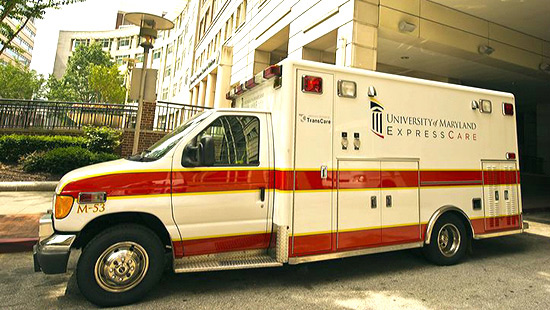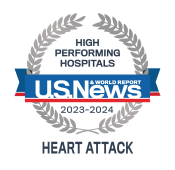Heart Attack

A heart attack occurs when the coronary arteries cannot deliver oxygen-rich blood to the heart.
This often happens because the coronary arteries have developed a buildup of plaque deposits, which cause the arteries to narrow.
When the heart is deprived of this much-needed blood, it becomes starved of oxygen and the heart muscle begins to die. This is a heart attack.
Heart attack patients often need an emergency procedure to reopen the arteries and allow for normal blood flow.
If you feel any sort of chest pain, call 911 immediately. Do not drive yourself to the hospital.
Heart Attack Symptoms
Chest pain is the most obvious symptom of a heart attack.
However, not everyone experiences chest pain. Symptoms of a heart attack include:
- Discomfort or heaviness in chest, arm or below the breastbone
- Discomfort in your back, jaw or throat
- A feeling like heartburn
- Sweating, nausea or vomiting
- Weakness
- Shortness of breath
- Irregular heartbeat
Heart Attack Treatment
At the UM Heart and Vascular Center, we provide comprehensive, rapid and effective heart care for patients experiencing a heart attack.
Our UM ExpressCare transport system brings critical care patients to our center for rapid, life-saving care. Our heart attack specialists are in communication with the ExpressCare team during the transport, so we are ready to deliver treatment the moment you come through the door.
Our team provides the full spectrum of heart attack treatment. From catheterization procedures to surgery, we offer comprehensive and personalized care. We provide ongoing follow-up care as well, so we can reduce the likelihood of another heart attack or cardiac event.
Heart Attacks and Coronary Artery Disease
Heart attacks occur because of a blockage or narrowing of the coronary artery.
The UM Heart & Vascular Center are experts at treating coronary artery disease. If you have a family history of coronary artery disease, we encourage you to make an appointment with our team for screening. This can help you to discover a blockage, allowing you to seek treatment before having a heart attack.
We also have a preventive cardiology program to help with lifestyle changes geared towards preventing a heart attack.
After a Heart Attack
After surviving a heart attack, you may have long-term complications. This could include:
- Arrhythmia: when your heart beats out of rhythm, either too quickly or too slowly
- Heart Failure: the heart may be damaged and no longer able to pump blood normally
Make an Appointment
Whether you are at risk for a heart attack and are interested in preventive measures, or if you are experiencing side effects after a heart attack, we are here to help. Call 410-328-7877 to make an appointment or to learn more about our program.

